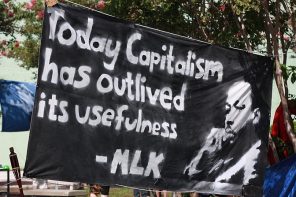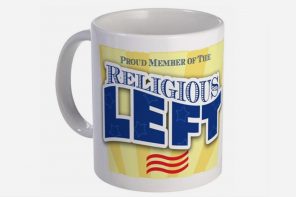Tuesday’s Democratic primary in New York made even clearer a point that has been obvious since Super Tuesday: Bernie Sanders almost certainly will not be the Democratic nominee in 2016.
But that doesn’t mean he should get out of the race.
As many have argued, when we get to Philadelphia, Sanders can use his total delegate count to leverage changes in the party platform or nomination process. He could press for a $15/hour minimum wage plank, for example, or try to get the Democratic party to abandon closed primaries. He’ll have to be selective—he won’t be able to shoot the moon—but there’s every reason to think Sanders and his movement will be strongly influential.
There are any number of priorities Sanders could choose from, of course. God knows it’s not like our nation isn’t in need of reform. At the moment, though, I’m less concerned with the pros and cons of any one issue than wondering what things might look like if Bernie tapped into what Rev. William Barber has named “fusion politics.” In the Christian Century, Jeremy Borden describes this as “an attempt to reframe the politics of morality in America, seizing it from conservative evangelism and arguing that care and compassion for all Americans is the essence of morality.”
And he quotes Barber saying to a crowd at a February rally that “we should be concerned . . . when politics is more a struggle over money and manipulation than a struggle over ideas. Politicians want us to be slaves to their decisions without citizens having the ability to register their discontent at the ballot box.”
There is something particularly populist in the water this year, isn’t there? Add a few boasts and Barber’s words could almost have been delivered by you-know-who. But as the article points out, Sanders has made a lot of hay “by promoting a similar message in a more secular way,” and yes, both Barber and Sanders seem to resonate with millennial voters.
It’s fascinating to wonder what might have happened in North Carolina had the Sanders campaign built a careful coalition with the Moral Mondays movement. Given Hillary Clinton’s deep reservoir of support with African-American voters, it might not have made much difference, but it’s an interesting counter-factual to contemplate. Barber himself seems to have thought along similar lines, suggesting at one point an alliance with the liberal netroots community Daily Kos, long a bastion for support for Sanders. (Full disclosure: I used to be very active at Daily Kos and formerly ran its religion-and-politics spinoff Street Prophets, but I have not been involved in years.)
I have long been suspicious of moral revivals in liberal politics. They have a way of petering out, or dissolving into mushy platitudes—and too often the prophets who lead them are unable to satisfy the hopes and dreams loaded on them by idealistic supporters. Moral Mondays seems to have lasted longer than most, though it has yet to capture the national imagination in any real sense. Despite any reservations, though, I can’t help thinking that trying to find (forgive me) synergy between Barber’s followers and Sanders’ might help both.
Sanders already has a very strong base among the non-religious, for example. Drawing in faith-based voters around populist themes would extend the strength. Likewise, Sanders has done very well among white voters, but had a tough time attracting blacks and Hispanics away from Clinton. Create a way to let the people Barber represent feel their issues are being taken seriously, and you have a very durable coalition in the offing.
To shorthand things a bit, but find the common ground between Raleigh-Durham or Greensboro and Portland, Oregon, and you’ve got political dynamite.
Going down this road would force Sanders (or more realistically, whoever succeeds him as the movement’s standard bearer) to make some significant adjustments, to be sure. Bernie’s laser-like focus on economic inequality has inspired many people, but it’s also turned off many who see sexism, homophobia, and racism holding their lives back. Barber’s vision of “fusion” specifically includes these issues in the movement’s portfolio, and the people he represents won’t have much patience with vague proposals or arguments about process. Just like any coalition, Feel-the-Bern-meets-Moral-Mondays would have to deliver tangible results to last.
Still, with Hillary Clinton almost certainly blocking Sanders’ road to the White House, teaming up a secular Jewish socialist and a southern black preacher might just be the path forward for liberal populism. It’s either that or try to poach superdelegates from the Methodists, and it’s hard to get an inspirational sermon out of that.




